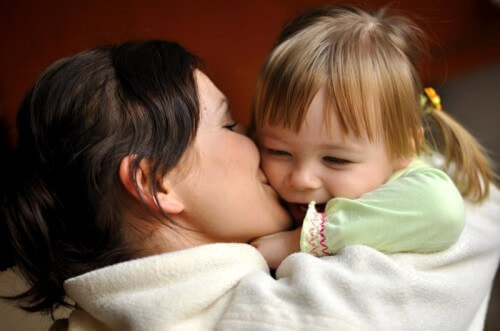6 Symptoms of Affective Deficiencies in Children

Affective deficiencies in children are increasingly evident in our society. Parents’ working hours are extensive, and time spent as a family is becoming more and more scarce. How does this affect the little ones?
Parents’ lack of attention is very harmful for children who are in the middle of their growth stage. Healthy affective relationships, which create affection and real interest, are as important for a child’s proper development as food and education.
Your child, like every human being, needs many sweet words, kisses, hugs and constant affection. Expressing affection in various ways will help your child achieve adequate brain maturation.
Affective deficiencies in children are silent
If you think your child isn’t at risk of emotional deprivation – because he lives in a home where he sees his parents every day and where he doesn’t experience extreme abuse or abandonment – it’s important to know that you could be mistaken.

A family that has little time and space to nurture their emotions through healthy coexistence is prone to suffer emotional deterioration.
If you ask yourself how you can fill your child with healthy emotions, one of the simplest answers is to share quality family time.
To achieve this, try to include entertaining activities in the family‘s schedule where everyone gets involved in pleasant moments that are worth remembering.
Games, homework or a simple snack are good opportunities to enjoy time together.
Remember that the important thing isn’t always the quantity of time spent together, but the quality.
Symptoms of affective deficiencies in children
A child with emotional deprivation may present certain symptoms or psychological patterns. Some of them are:
- Anxiety. Anxiety is a symptom of emotional deprivation that affects both children and adults. Never being able to focus, feeling the constant need to eat and impatience are strong symptoms of lack of affection in a child.
- Poor development of language and social interaction. Correct language development is mainly achieved through good education from childhood. However, a very important part is acquired thanks to interaction with others. If a child’s social skills at home aren’t healthy or non-existent (the result of poor socialization and affection), he’ll have a harder time expressing himself than other children, and language acquisition will occur more slowly.
- Not knowing how to control impulses and responding aggressively. Impulses are dominated by emotions. If a child has difficulty controlling his impulses, shows sudden changes in behavior and gives generally aggressive responses, it’s your responsibility to see if he’s experiencing a lack of affection in order to mitigate these negative impulses.
A family that has little time and space to nourish their emotions through healthy coexistence is prone to suffer emotional deterioration
- A lack of trust in others. It’s very difficult for a child lacking in affection to develop trust in others, even with people in their family. The child may feel misunderstood, and prefer to close himself off in order to avoid emotional suffering.

- Difficulty paying attention. When a child shares enough time with his parents in an environment full of understanding, it’s customary from a young age to pay attention to what is being said to them, since they’ve understood the importance of being heard. However, if your child doesn’t pay attention easily, you can consider this as one more symptom of emotional deprivation.
- Not knowing how to express their feelings in a healthy way. Feelings aren’t easy to control or express, and for a child with affective deficiencies, it becomes even more complicated. A child with emotional deprivation won’t usually know how to manage his feelings because no adult has taught him how to do so.
If this type of pattern isn’t amended in time, these problems could accompany the child throughout his life.
A child who doesn’t know how to express his feelings will likely become a self-centered and emotionally dependent adult with few social skills.
All cited sources were thoroughly reviewed by our team to ensure their quality, reliability, currency, and validity. The bibliography of this article was considered reliable and of academic or scientific accuracy.
- Vilaltella, J. T. (1994). Bowlby: vínculo, apego y pérdida CARENCIA AFECTIVA.
- Hernández, I. C. S., & Palacio, H. L. (2014). Acciones de orientación familiar para prevenir la carencia afectiva en los niños mediante la comunicación. Razón y palabra, 18(88). https://www.redalyc.org/pdf/1995/199532731033.pdf
- Bielsa, A. Carencia afectiva. Centre Londres, 94, 1-19. http://www.centrelondres94.com/files/carencia_afectiva_1.pdf
- Contreras, G. (2010). “La Carencia Afectiva Intrafamiliar en niños y niñas de 5 años” (Tesis.) Retrieved from http://dspace.ucuenca.edu.ec/handle/123456789/2338
- Jaar, H. E., & Córdova, V. M. (2017). “Prevención de la carencia afectiva crónica: nuevos paradigmas en el modelo de familia de acogida temporal”, Revista Chilena de Neuro-Psiquiatría, 71. 55 (1): 44-51.
- Papalia, D. (2003). Desarrollo humano. México: McGraw-Hill.
This text is provided for informational purposes only and does not replace consultation with a professional. If in doubt, consult your specialist.
